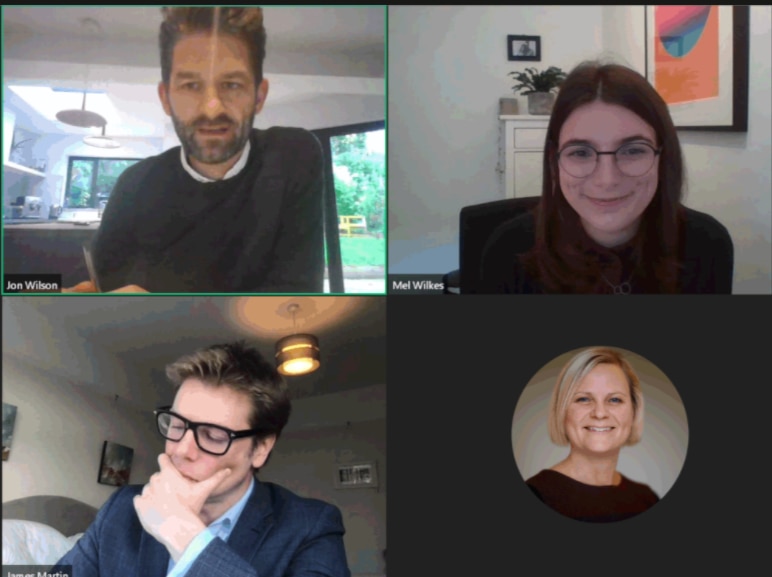How to embed employee training and upskilling into your business strategy
Shape your learning and development agenda for 2021 and beyond with the best insights pulled from our webinar on the future of skills development in the UK.

It’s understandable if L&D has taken a backseat in your business in light of the Covid-19 pandemic.
Training budgets fell an average of 15% this year, with half (49%) of the businesses who made L&D reductions saying they felt their hands were forced due to the pandemic.
However, with the government’s Lifetime Skills Guarantee (LSG) launching in April 2021, it’s an opportune moment for businesses to refocus on the mid to long-term, maximise on government investment, and reconsider how L&D can prepare the UK’s workforce for challenges in 2021 and beyond.
In our recent webinar, The skills puzzle: how far does government support go?, we explored our latest research into skills development in the UK, asking a panel of industry experts their input on a range of topics, from the government’s Lifetime Skills Guarantee to how employers can best embed training and upskilling into their broader business plans.
Read the advice our guests shared below.
Tips on how to integrate training and upskilling into your business
Leverage L&D as a future-proofing measure
“With real crises facing people, it can sometimes be a difficult time to think about long-term, future solutions – but really that’s what we need. This pandemic has accelerated business trends that already existed within our economy, so future-proofing is needed now more than ever to make sure we’re not simply reacting to these crises, but that we have robust processes in place to make sure that we can deal with them in the future. With that, training, reskilling and upskilling are essential to boost career prospects – and the wider UK economy – in the months and years to come.”
Jon WilsonCEO at Totaljobs Group
Bridge the gap between employees and adult education
“We found that there were 7.5 million workers who haven’t received any training since leaving full-time education. The stakeholders and employers that we spoke to told us that for a lot of people, negative experiences of training or education can mean that it’s really difficult to go back and re-engage later on.
Plus, lower levels of literacy, numeracy or digital skills have huge stigma associated with them which can make it really hard for some workers to approach a training provider or look into learning opportunities. That’s a huge group of people who could benefit from training but might feel quite distant from the adult education system.”
Melanie Wilkes Head of Research at The Work Foundation
Focus on these five skillsets to help future-proof your workforce
“We’ve recently launched The Skills Accelerator, which is all about trying to help people understand the skills that can help them in their future. Our free skills sessions aim to unlock skills across five key areas: leveraging change, learning to unlearn, resilience, acute emotional intelligence, and partnering with artificial intelligence and understanding how to work collaboratively with AI. Focussing on these skills through virtual workshops gives us the opportunity to reach a global and diverse audience and provide skills to people who may not have access to that sort of training usually.”
Victoria HylandGlobal Head of Sourcing & Attraction at bp
Tackle employee confidence to boost the uptake of training
“Time and again we heard from both employers and policy stakeholders that confidence is absolutely key – that’s related both to confidence in personal abilities, but also to a belief that training is worthwhile.
For many employees, there’s a sense that training involves a huge commitment – both in terms of time and potentially working hours lost through attending training courses – so that personal investment needs to deliver a payoff. For lots of people there’s a perception that training won’t unlock those opportunities for progression, better responsibilities or higher pay.”
Melanie WilkesHead of Research at The Work Foundation
Explore news ways of supporting parents and carers through your L&D plan
“Looking at the 2008 recession, what we actually saw was women did proportionately worse after the recovery than men. It’s difficult to say why, but it looks a lot like childcare wasn’t fully taken account of, and women tend to have more childcare responsibilities than men.
So in economic terms, you have a piece of the supply side of the economy, those with childcare responsibilities, which many companies don’t fully cater for the needs of – or they try and cater for them in a traditional way – and they miss out on a lot of under priced talent because they can’t think in terms of the whole package.
If you can design your development, training and attraction packages for people who have a life outside of work – including children or caring responsibilities – then you will do, I suspect, considerably better than people who don’t”
James MartinDirector of Policy at the British Chambers of Commerce
Top up digital skills within your business
“We engaged with subject experts and with employers. Digital skills just kept coming up, and one of the stakeholders we engaged with compared digital to literacy. She said we learn to read once and then we know how to read – it’s done. Sure, we practice – whether it’s for work or leisure – and we keep our reading skills going, but you don’t really need to go back and learn how to read again. Digital skills are the opposite of that. We’re still learning it. You can’t complete a training course once and then it’s off you go. All of us are constantly adapting to digital and we’ll need to keep on nurturing our digital skills throughout our working lives.”
Melanie WilkesHead of Research at The Work Foundation
Focus on management training to get dividends in the long-term
“Very often people become line managers by accident, they learn as they go. What we know works well is supporting people to develop those soft skills as managers through a combination of methods, whether it’s mentoring or formal training. This then encourages greater access to learning and development across a businesses, as managers who are really interested in their teams are more likely to be thinking ‘okay, let’s have a conversation about your long-term professional development’. So investing in your managers can pay dividends in the long run.”
Melanie WilkesHead of Research at The Work Foundation
Use virtual events to kick start your training programmes
“We’re really fortunate about having virtual platforms that make training a lot easier right now. You can redeploy the time and cost of physically running events, because you can do it all online using social media to market the event and partnering with other organisations in your network – that will really help you get it off the ground.”
Victoria HylandGlobal Head of Sourcing & Attraction at bp
Tips for tackling skills development at a policy level
Strategise for now as well as for the future
“It’s crazy to think that someone who’s not working today has a limit on the amount of training that they can do, or someone that has an A-level 20 years ago is suddenly overqualified for training through the Lifetime Skills Guarantee.
80% of the people in work today will make up the workforce in 2030 and most of our training is focused on what someone is doing today, plus we know that the economy is only accelerating, so thinking about UK plc, it’s vital that the government make those changes to not only help people now find work, but also help our own economy grow over the next 10 years so.”
Jon WilsonCEO at Totaljobs Group
Open up criteria for the Lifetime Skills Guarantee
“The pandemic has exacerbated problems that were already here. First, one of the things that we saw very much was a failure of the skill system to keep up with digital skills that were incredibly important two years ago, and are now absolutely essential.
This brings us to the second point: there’s a gap sometimes in terms of soft skills, of being business-like, particularly in the young cadre – those who are entering now, who would still be in the workforce in 2040.
Finally, that brings us to a policy point around the Lifetime Skills Guarantee, which is applying a qualification filter, but actually, what we’re seeing is that the lack of qualifications is not the gap. It’s the lack of social skills, the lack of modern digital skills. That might mean the wrong filter is being applied to get people into this accelerated cadre, and to me, that really does highlight the need to have another look at the Lifetime Skills Guarantee.”
James MartinDirector of Policy at the British Chambers of Commerce
More resources on skills development
- Watch the webinar in full for more insights and research from our expert panel
- Download the need-to-know for business report for a breakdown of the research
- Download the Learning to Level Up report for a more granular look at the employee skills development policy landscape
- Visit our Skills development hub for updates on the Lifetime Skills Guarantee – and the policy action we’re taking as a business.




